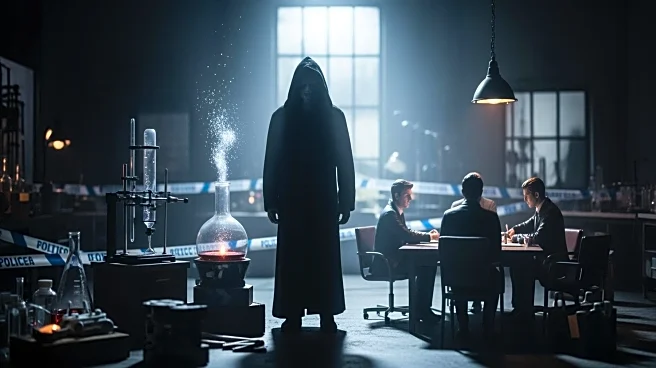What's Happening?
Oscar-winning director Guillermo del Toro is set to release a new adaptation of the classic horror story 'Frankenstein.' Known for his unique approach to storytelling, del Toro is adding his personal touch
to the tale of a scientist who creates a man from body parts. In an interview with Seth Doane, del Toro expressed his lifelong fascination with horror and shared insights into his creative process. The film features Oscar Isaac and Jacob Elordi, who portray Victor Frankenstein and his creature, respectively. Del Toro's adaptation promises to explore the themes of identity and the inherent strangeness within everyone, as he believes that 'in reality we're all weird in some way.'
Why It's Important?
Guillermo del Toro's adaptation of 'Frankenstein' is significant as it brings a fresh perspective to a story that has been retold numerous times in film history. Del Toro's unique vision and storytelling style are expected to offer new insights into the classic tale, potentially attracting a diverse audience and sparking renewed interest in horror films. The involvement of acclaimed actors like Oscar Isaac and Jacob Elordi adds to the film's appeal, promising strong performances that could resonate with viewers. This adaptation may also influence future horror projects, encouraging filmmakers to explore deeper themes and character complexities.
What's Next?
The release of Guillermo del Toro's 'Frankenstein' is anticipated to generate discussions among film critics and audiences about the reinterpretation of classic horror stories. As the film approaches its premiere, promotional activities and interviews with the cast and crew are likely to increase, building anticipation and interest. The film's reception could impact del Toro's future projects and collaborations, as well as the careers of the actors involved. Additionally, the film may inspire other directors to revisit classic tales with innovative approaches, potentially leading to a resurgence of interest in horror adaptations.
Beyond the Headlines
Del Toro's adaptation of 'Frankenstein' may prompt discussions on the ethical implications of scientific experimentation and the quest for identity. The film's exploration of these themes could resonate with contemporary audiences, reflecting societal concerns about technology and human nature. Furthermore, del Toro's emphasis on the 'weirdness' within everyone might encourage viewers to embrace individuality and diversity, fostering a broader cultural conversation about acceptance and self-discovery.









